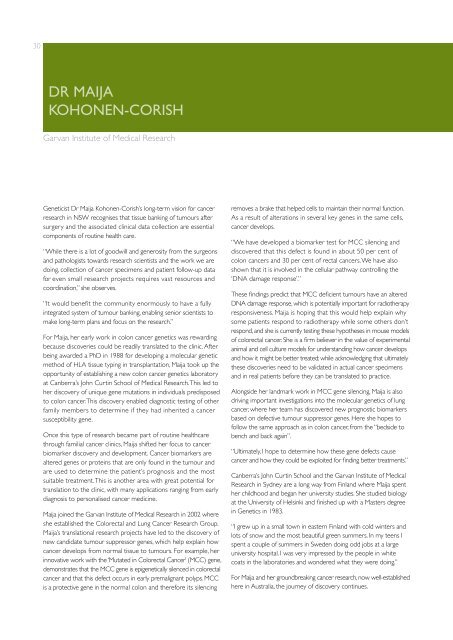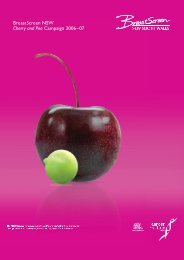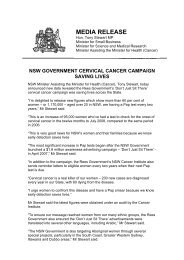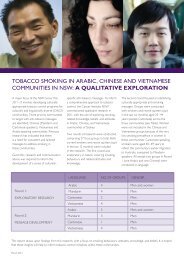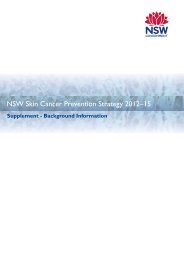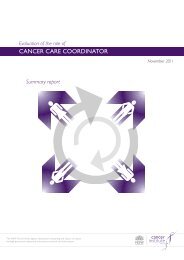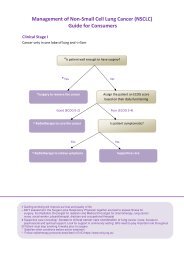NSW Research Achievements Report 2011 - Cancer Institute NSW
NSW Research Achievements Report 2011 - Cancer Institute NSW
NSW Research Achievements Report 2011 - Cancer Institute NSW
Create successful ePaper yourself
Turn your PDF publications into a flip-book with our unique Google optimized e-Paper software.
30Dr MaijaKohonen-CorishGarvan <strong>Institute</strong> of Medical <strong>Research</strong>Geneticist Dr Maija Kohonen-Corish’s long-term vision for cancerresearch in <strong>NSW</strong> recognises that tissue banking of tumours aftersurgery and the associated clinical data collection are essentialcomponents of routine health care.“While there is a lot of goodwill and generosity from the surgeonsand pathologists towards research scientists and the work we aredoing, collection of cancer specimens and patient follow-up datafor even small research projects requires vast resources andcoordination,” she observes.“It would benefit the community enormously to have a fullyintegrated system of tumour banking, enabling senior scientists tomake long-term plans and focus on the research.”For Maija, her early work in colon cancer genetics was rewardingbecause discoveries could be readily translated to the clinic. Afterbeing awarded a PhD in 1988 for developing a molecular geneticmethod of HLA tissue typing in transplantation, Maija took up theopportunity of establishing a new colon cancer genetics laboratoryat Canberra’s John Curtin School of Medical <strong>Research</strong>. This led toher discovery of unique gene mutations in individuals predisposedto colon cancer. This discovery enabled diagnostic testing of otherfamily members to determine if they had inherited a cancersusceptibility gene.Once this type of research became part of routine healthcarethrough familial cancer clinics, Maija shifted her focus to cancerbiomarker discovery and development. <strong>Cancer</strong> biomarkers arealtered genes or proteins that are only found in the tumour andare used to determine the patient’s prognosis and the mostsuitable treatment. This is another area with great potential fortranslation to the clinic, with many applications ranging from earlydiagnosis to personalised cancer medicine.Maija joined the Garvan <strong>Institute</strong> of Medical <strong>Research</strong> in 2002 whereshe established the Colorectal and Lung <strong>Cancer</strong> <strong>Research</strong> Group.Maija’s translational research projects have led to the discovery ofnew candidate tumour suppressor genes, which help explain howcancer develops from normal tissue to tumours. For example, herinnovative work with the ‘Mutated in Colorectal <strong>Cancer</strong>’ (MCC) gene,demonstrates that the MCC gene is epigenetically silenced in colorectalcancer and that this defect occurs in early premalignant polyps. MCCis a protective gene in the normal colon and therefore its silencingremoves a brake that helped cells to maintain their normal function.As a result of alterations in several key genes in the same cells,cancer develops.“We have developed a biomarker test for MCC silencing anddiscovered that this defect is found in about 50 per cent ofcolon cancers and 30 per cent of rectal cancers. We have alsoshown that it is involved in the cellular pathway controlling the‘DNA damage response’.”These findings predict that MCC deficient tumours have an alteredDNA damage response, which is potentially important for radiotherapyresponsiveness. Maija is hoping that this would help explain whysome patients respond to radiotherapy while some others don’trespond, and she is currently testing these hypotheses in mouse modelsof colorectal cancer. She is a firm believer in the value of experimentalanimal and cell culture models for understanding how cancer developsand how it might be better treated; while acknowledging that ultimatelythese discoveries need to be validated in actual cancer specimensand in real patients before they can be translated to practice.Alongside her landmark work in MCC gene silencing, Maija is alsodriving important investigations into the molecular genetics of lungcancer, where her team has discovered new prognostic biomarkersbased on defective tumour suppressor genes. Here she hopes tofollow the same approach as in colon cancer, from the “bedside tobench and back again”.“Ultimately, I hope to determine how these gene defects causecancer and how they could be exploited for finding better treatments.”Canberra’s John Curtin School and the Garvan <strong>Institute</strong> of Medical<strong>Research</strong> in Sydney are a long way from Finland where Maija spenther childhood and began her university studies. She studied biologyat the University of Helsinki and finished up with a Masters degreein Genetics in 1983.“I grew up in a small town in eastern Finland with cold winters andlots of snow and the most beautiful green summers. In my teens Ispent a couple of summers in Sweden doing odd jobs at a largeuniversity hospital. I was very impressed by the people in whitecoats in the laboratories and wondered what they were doing.”For Maija and her groundbreaking cancer research, now well-establishedhere in Australia, the journey of discovery continues.


